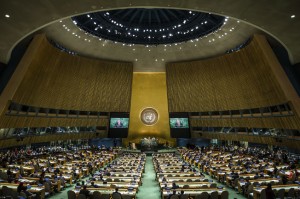Pressure from Religious Nations Checks UN Action for Human Rights
 The UN General Assembly in New York.
The UN General Assembly in New York. In a world where religious faith seems to be losing its grip on the policies and politics of our time, it appears that those evangelical forces who would use faith as an explanation to block progressive action are still very much alive and well—to the detriment of all others in a secular democracy.
It may seem strange that when we challenge religious attempts to halt social progress, those invested in faith traditions would consider such challenges a denial of their religious freedom. In actuality, these challenges to faith in the political realm usually ensure that the mandates and rights of people living under constitutional pluralism are upheld so that faith-based laws don’t hinder modernity.
One of the most glaring conflicts of the overreach of organized political faith happened earlier this June. Saudi Arabia, and a host of Arab nations, successfully pressured the UN to not list them in a report on nations who have caused child murder during support of military actions. As CNN details it, “…last month, a UN report claimed the alliance was responsible for 60 percent of the 1,953 children recorded as killed or maimed in the conflict (in Yemen) in 2015—a sixfold rise since the previous year. They were added to a blacklist of groups violating children’s rights in armed conflict, before dropping off the list again earlier this week.”
This whitewashing of facts by the UN isn’t the first time powerful nations have used their religious political persuasion as well as threats to withhold UN aid contributions in order to get away with egregious violations of human rights. Indeed, religious faith, economics, and politics are well-entwined at the United Nations much like a strand of DNA.
However disgraceful this abuse of power may seem, it perhaps pales in comparison to the “thumb one’s nose” stance taken by the Vatican. In the aftermath of the 2014 UN Report of Catholic Clergy Abuse of Children, which found decades of consistent obfuscation by church leaders related to priest sex abuse, little has been done to help the families and bring abusers to justice.
The collusion of senior leaders of the Church working to protect pedophiles is real, and to date only three bishops have been defrocked or retired. The rest continue in their religious duties while others, although demoted, still hold positions of power within the church. And the Vatican continues to offer aid to the UN while at the same time working behind the scenes to limit secularism, family planning, and various rights of the Universal Declaration of Human Rights.
Indeed, I have witnessed the overwhelming bias in many UN meetings that center on what the religious or interfaith response should be to a wide variety of human rights issues. While the intentions are, for the most part, honest efforts to help those in need, such dialogue works to maintain the status quo while leaving humanist and other secular NGO groups out of the deliberation process. In my two years of advocacy work at the UN, I have not witnessed a single occasion at the New York headquarters where secularists are invited as individuals or as panelists into the discussions regarding human rights policy or to serve in any advisory capacity.
If you turn the mirror around and look at our own involvement, the Freedom of Religion and Belief Committee of which I primarily serve does have representation, as does the IHEU. But practically all of the committee members are composed of minority faiths and nations that have traditionally been neglected or outright abused by overwhelming religious majorities.
But everyone within this group has one thing in common. We’ve all been abused by hostile faith-based governments and religious vigilante groups, which ban, hamper, or deny our human rights. Here too, the members of the committee have little appreciation for humanists and other nonbelievers although they accept us as allies to their causes.
The Special Rapporteur of Religion and Beliefs’ March 2016 report clearly states that freedom of and from religion are complimentary rather than contradictory. But this is like saying that one can accept the biblical creation of the universe and also cosmic and biological evolution. Such polarity is inevitable because both cannot be true at the same time. These ideas do not have parallel worth, but in fact are fundamentally opposed to each other’s philosophical and ontological purpose for being.
So what can we do? Because those who wish to hamper secularism and modernity will do so in many ways and in many venues, secularists must take a wider and deeper advocacy stance at the local and global levels. (Although, it is certainly much easier and less disaster-laden to do so in nations that already permit free expression, be they religious or not.)
Furthermore, it is deeply important to WITNESS the injustices by faith-based groups and nations, and report them freely. The UN’s willingness to remove Saudi Arabia from the terror report and their lack of will to pressure the Vatican to punish those responsible for child rape means that the organization is complicit in the same human rights violations it seeks to shed light on and diminish.
This last part is an abandonment of the true purpose of the UN as a world body designed to stand for human rights and justice, a world body which is supposed to alleviate and avert the suffering of millions of innocents who cannot give voice to their own pain, suffering, and oppression.
